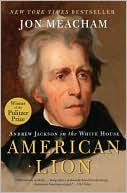AMERICAN LION: Andrew Jackson in the White House
$5.00
Availability: 1 in stock
Availability: 1 in stock
Condition: Good
Format: Trade Paperback
Categories: Biographies
| Weight | 48 oz |
|---|---|
| Book Authors | Jon, Meacham |
Andrew Jackson, his intimate circle of friends, and his tumultuous times are at the heart of this remarkable book about the man who rose from nothing to create the modern presidency. Beloved and hated, venerated and reviled, Andrew Jackson was an orphan who fought his way to the pinnacle of power, bending the nation to his will in the cause of democracy. Jackson s election in 1828 ushered in a new and lasting era in which the people, not distant elites, were the guiding force in American politics. Democracy made its stand in the Jackson years, and he gave voice to the hopes and the fears of a restless, changing nation facing challenging times at home and threats abroad. To tell the saga of Jackson s presidency, acclaimed author Jon Meacham goes inside the Jackson White House. Drawing on newly discovered family letters and papers, he details the human drama the family, the women, and the inner circle of advisers that shaped Jackson s private world…
The Barnes & Noble Review
“This is not an academic study” of Jackson’s presidency but rather “a biographical portrait of Jackson and of many of the people who lived and worked with him,” Jon Meacham tells us. Meacham, editor of Newsweek and the author of several bestselling political histories, was given access to troves of letters in the possession of the president’s descendants and has fashioned from them a view of Jackson and his times that illuminates the culture and manners of the Washington community and the importance of it for presidential policymaking.
The narrative focuses not just on President Jackson but also on his household circle: because his beloved wife, Rachel, died before he was inaugurated, Jackson relied on his nephew Andrew Donelson (whom he had raised) and Donelson’s wife, Emily, the former serving as his key aide, the latter as the hostess of his house. Meacham recounts how the three of them were caught up in a contretemps over the wife of the newly appointed secretary of war, John Eaton; Margaret Eaton was rumored to have borne a child while her first husband was away at sea (an absence longer than nine months), and Vice President Calhoun, the other cabinet secretaries and their wives, and most of the diplomatic corps refused to receive her, call on her, or recognize her in polite society. The treatment of Mrs. Eaton enraged Jackson; he and Rachel had lived together and taken marriage vows while she was technically still married to another man, and Jackson had fought duels to defend his wife’s reputation out on the frontier. Young Emily Donelson, wanting to be accepted in Washington society, not only resisted pressures from “Uncle” to receive and call on Mrs. Eaton but also managed to outmaneuver him and retain her freedom of action. For much of the first term, the Donelsons remained a source of avuncular pride but also a source of frustration to Jackson, who could find contentment neither in the White House nor in the wider affairs of the capital.
This is a story that has been told before, and much of its significance lies in the fact that Jackson gave up on most of the cabinet (because they sided with the anti-Eaton forces, including some clergy leading the morality charge) and relied instead on a so-called Kitchen Cabinet of close advisers — and a good thing for the country, since Jackson’s first-term cabinet was (with the exception of Secretary of State Martin Van Buren) particularly incompetent. What Meacham adds here is the way the Donelsons experienced Jackson’s travails, through letters that describe much of the maneuvering and all of the family tensions and squabbles. Time and again Meacham notes that Jackson seeks control and order and is denied both — in his family and in the Washington community — thus giving us a vivid view of the personal and political pressures. It is a portrait as well of the frontier culture transposed to the capital, in which personal slights are immediately noted, in which honor must be preserved, and in which physical violence always lurks just below the surface. And sometimes it does surface: one evening Eaton can take no more and wanders through the night searching for one of his tormenters, intent on killing the man. The potential victim appeals to Jackson, who downplays the threat, leading the man (wisely) to remove himself to Baltimore.
Eventually, Van Buren figures a way to defuse the tension: he resigns his post, thus precipitating a cabinet shuffle that also removes Eaton from the War Department and removes the Eatons from Washington. That in turn vastly improves Jackson’s relationship with the Donelsons. And with all that settled, the second half of Meacham’s biography takes a more conventional turn, with wonderfully crafted descriptions of some of the major political battles of the Jacksonian period. There is the veto of the bill rechartering the Bank of the United States, and Meacham expertly plumbs its significance — Jackson’s veto was cast on constitutional grounds, and even though the constitutionality of the bank had been supposedly settled by the Supreme Court in McCullough v. Maryland, Jackson asserted his power of concurrent interpretation. There is Jackson’s order to Secretary of the Treasury Duane to remove deposits from the bank and place them in “pet” banks in the states, and Meacham explains why this prerogative to direct a secretary of the Treasury was a novel position in constitutional law, since this official was until then deemed to be as much supervised by Congress as by the president. There is the threatened nullification of a high tariff by South Carolina, with the ultimate threat of secession in the background; Meacham recounts the spirited Senate speeches on both sides of the issue (some of the best oratory in American history) and the final resolution of the matter; a new and lower tariff was passed at the same time as a bill allowing the president to use force to enforce the laws.
Some of the most harrowing pages involve the removal of Indian tribes from the Southeast to the Southwest. While Meacham goes easy on Jackson’s own past as a warrior against Indians (who had many unflattering names for Jackson, none of which appear in the book), he does explain Jackson’s ambivalent feelings about the tribes and his eventual decision to force what became known as the Trail of Tears and the decimation of the Indian populations. Similarly, Meacham provides accounts of the brutal treatment of slaves within Jackson’s own family; he and the Donelsons and others in his extended family relied heavily on their slaves for household service, plantation labor, and, in Jackson’s case, even the management of his properties. Although these slaves were severely disciplined with the lash, as Jackson lay dying at the plantation he comforted those in his presence by stating that “Christ has no respect to color” and that “we will all meet in Heaven.”
Meacham’s book is part of a welcome trend in presidential biography to weave together the presidential personality, the household interactions, and the politics of the era. “There is properly no history, only biography,” Ralph Waldo Emerson noted, and in this masterly portrait of the Jackson clan, with fascinating mini-biographies of a cast of characters that seem made for a television series, it seems clear that Meacham has proven Emerson’s point. But don’t wait for the cable version; this is a book of wisdom about human nature, the American political culture, the politics of the Washington community, and so much more. —Richard Pious
Richard Pious is Adolph and Effie Ochs Professor at Barnard College and the Graduate School of Arts and Sciences, Columbia University. He is the author of The President, Congress and the Constitution (1984) and The War on Terrorism and the Rule of Law (2006), among other works. He has recently published articles on military tribunals, interrogation of detainees, warrantless surveillance, and war powers.
Publish Date : 2009-04-30T00:00:01Z
| Weight | 48 oz |
|---|---|
| Book Authors | Jon, Meacham |














Reviews
There are no reviews yet.